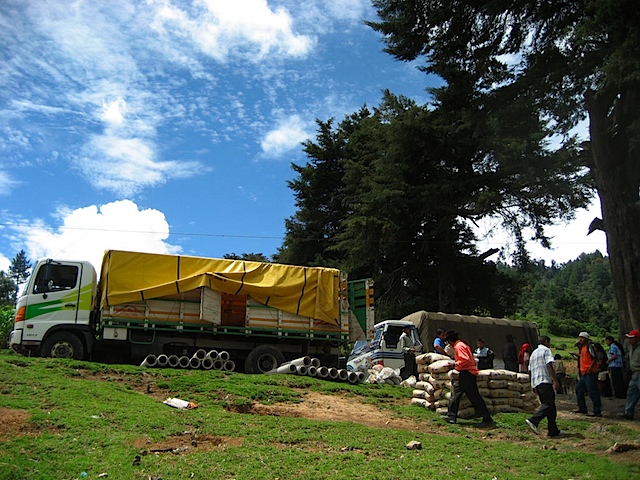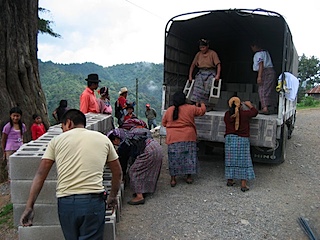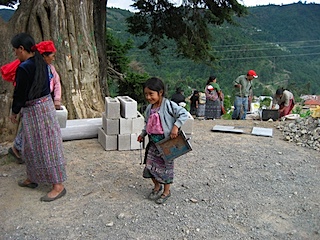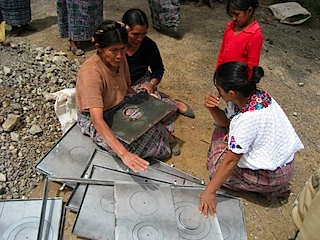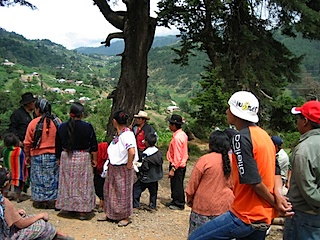We’re still working on the pilas. We’re well into the rainy season, but we’ve been lucky so far and the sun’s been out almost every day. We only need the luck to hold out a little longer, and then we’ll be building the stoves… indoors. The materials for the stoves arrived yesterday, so after we had poured the base of yet another tank, Diego invited me to go up the hill with him to supervise the distribution of materials. I say “up the hill” because there are actually two roads that wind into our valley: one that follows the river, and another that snakes up the wall of the valley and passes nearer to the ridge. The village leaders had been clever and scheduled deliveries down both roads so that the supplies would get as close to each house as possible. This is a big deal, as we’ll see shortly.
When we arrived, villagers were already unloading the two trucks that contained all we needed for 15 stoves, totaling about 10,000q in materials. A festive atmosphere prevailed; everyone was smiling, the sun was out, and there were lots of new toys for everyone. Kindof like Christmas. A bucket brigade of women in traje were unloading concrete block from one of the trucks, and the other truck was disgorging steel planchas, fire brick, bags of cement, precast chimneys, you name it. Everyone was carrying materials, chattering to each other, comparing notes. I saw three ladies sitting together on the ground, looking at the planchas. A plancha is a cooktop made from plate steel with removable holes for pots and pans, where all the meals are prepared. “Pim!” one lady said, smiling. The other nodded. “Pim.” I learned that word last week, it means “thick”. They were excited because we bought some high-end stovetops that won’t warp after a few years of use; thicker is better, and these brutes are a whopping 3/16″ thick.
Out came my camera, and everyone started goofing around, wanting their picture taken, saying stuff to me in Q’anjob’al so I could reply with my limited vocabulary. At one point, I looked back at my backpack I’d set on the ground, and saw that a bread I’d been given as a gift was lying on the ground next to it, half eaten. “Blah blah blah no’ tx’i!” shouted the women, laughing. I had to laugh too; I caught enough of what they were saying to know that a dog had stolen my snack. “K’am miman xeka!” (My big bread is gone!) I yelled back, feigning horror and bringing even more laughs. “No’ tx’i!” That darn dog!
I looked over my shoulder to see Diego standing, notebook in hand, talking to people and marking stuff down. I’m proud of him; he’s done a great job of managing a lot of the back-end of the project, and has been diligent in making sure that everyone gets their fair share and the right things show up at the right place at the right time. Times like this make me realize how much work the leaders are really doing for this project.
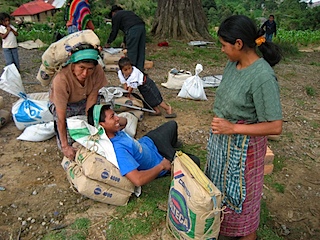 Once all the materials were present and accounted for, people started carrying off their stuff, to store at their house until the work crews can arrive. I saw guys load up with two 100-pound sacks of cement on their backs at once, then start down the mountain trail to their house a quarter mile away. Old ladies only carried a single 100-pound sack. Even little girls joined in; I saw one with a cinder block attached to her headstrap, and another carrying the steel door to a stove. I must not forget that it’s more than the leaders doing the work; each and every family has put a lot of time and effort into this, carrying hundreds of pounds of gravel, cement, brick, and so forth over great distances.
Once all the materials were present and accounted for, people started carrying off their stuff, to store at their house until the work crews can arrive. I saw guys load up with two 100-pound sacks of cement on their backs at once, then start down the mountain trail to their house a quarter mile away. Old ladies only carried a single 100-pound sack. Even little girls joined in; I saw one with a cinder block attached to her headstrap, and another carrying the steel door to a stove. I must not forget that it’s more than the leaders doing the work; each and every family has put a lot of time and effort into this, carrying hundreds of pounds of gravel, cement, brick, and so forth over great distances.
The brotherhood of working together for something good, combined with the sense of pending success, was almost tangible. Quite by accident, it turned out to be one of my most rewarding days as a Peace Corps volunteer.
